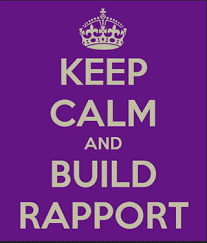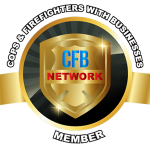
“Rapport is the ability to enter someone else’s world, to make him feel that you understand him, that you have a strong common bond.”
–Tony Robbins
This is the second in a series of three blogs on the intricacies and application of rapport to the interview process. They will address why rapport is foundational and essential to success in maximizing the quality and quantity of truthful information obtained during interviews.
In the first blog we examined the three levels of rapport; casual, close, and intimate, and our need to traverse those levels to effectively develop a relationship to maximize the quality and quantity of truthful information we receive in the interview.
The concept of rapport at its root is so simple, and certainly rings of common sense, but statistics from recent research regarding its use and application are dismal at best. Despite its inherent value to the interviewer, less than 10% of all interviews are found to have adequate rapport developed.
When I query classes I teach all over the country about attendee’s interviewing strength, large percentages declare it is rapport. However, in practice and when I observe their behavior in mock interviews, their performance belies this fact. Many believe quality rapport occurs if they talk about football, traffic and the weather. This is a shallow oversimplification of what can be a complex and effective weapon system for us. We must deepen our understanding.
Rapport is one of those words we don’t hear a great deal in our daily landscape, but it is one imperative to master in interviewing. Recently, I was doing interviewing instruction to criminal justice emphasis students in our local high school, about 60 of them, and asked how many knew what rapport was. There was not one. So we talked a great deal about its value and implementing it in the interview process. It is one of the tools that will set us apart from mediocre interviewers.
So not to be too basic, here is what rapport is defined as:
rap·port: /raˈpôr,rəˈpôr/; noun
DEFINITION: “a harmonious, empathetic, or sympathetic relation or connection to another self. An accord or affinity. In an ecological alignment with another system.” Origin: mid 17th century: French, from rapporter ‘bring back.’
One of the most important elements of human interaction and communication is establishing rapport. The success of an interview often depends on how well you have deliberately developed rapport with the interviewee. There are seven interviewing foundational requirements regarding rapport:
- It begins immediately
- It conditions the interviewee to talk
- It allows the establishment of a baseline of behavior
- It establishes trust and credibility
- It must be re-emphasized if reserved or hostile. We control the “temperature” with it.
- We should establish it with all to whom we talk, suspects as well
- We must continue throughout interview, as needed
Rapport begins immediately, long before we enter the progression to rapport in the interview, but rather in our first interaction with the interviewee. How many people have you interviewed that you had met before? Did the rapport begin when you walked in the room, or the first time you met them? Remember what you have been told about first impressions. This is an important reason to be credible and consistent in who we are, so that a hypocritical dichotomy is not established right from the start. Initiating contact should be strategized to maximize engagement. Are you going to call them? How is your phone demeanor? What is your plan?
One of the major purposes for rapport is conditioning the interviewee to talk. Many times when investigators and auditors show up to speak to an employee, those people do not get giddy with the desire to talk to you. Frankly, they often clam up. Generally, the person we are speaking to is experiencing some fear or anxiety about their interaction with us (whether they have done something wrong or not). These emotions tend to make individuals less talkative and less likely to share information. Rapport moves those individuals to talk about non-threatening, neutral issues, which conditions them to keep on talking when we get to the more difficult subjects.
If we are going to view and interpret verbal and non-verbal indicators of deception, we must establish a behavioral baseline. It is said that you can’t know what someone looks like when they are lying, until you know what they look like when they are telling the truth. Rapport allows us to establish this baseline of “normative” behavior that we then look for deviations from when difficult questions are asked and stress and fear build.
The application of rapport helps to establish trust and credibility. These elements must be formed if we have any expectations of obtaining truthful information. Think about it in your own life, how much do you share with someone you don’t know, don’t trust, and don’t believe in? Recent research clearly indicates that over 60 % of individuals who admit to wrongdoing do so because of the credibility and integrity of the interviewer. So when you think about employing some half-baked ruze in the interview room, consider the ramifications of destroying trust and credibility.
When an interview doesn’t go as anticipated, that being most of them, adequate planning has hopefully prepared us for those eventualities. When the interviewee becomes upset rapport must be re-emphasized with those who are reserved or hostile. We control the “temperature” with our application of rapport. This is why I say rapport must be infused in the interview. You could unintentionally say something that offends the interviewee and rapport becomes the manner to bring things back into equilibrium. Just because someone we are talking to is not being “nice” to us, this does not give us the right to snap back. Rapport becomes our most effective tool to reestablish harmony.
Rapport is not just for friends and family, and only those we like. It is our responsibility to establish it with all that we interview and most definitely with suspects as well (those that choose to be deceptive). We also never know when we will again come in contact with this individual. In the spirit of consistency and credibility we need to establish that with those we converse with.
Don’t see rapport as a once and done in the interview room. It is a process of application that we must continue throughout interview, as needed.
Who do you have a natural rapport with? Generally, people like people who are like themselves. This is why we pick our friends from those individuals whose values, likes and dislikes, professions, etc., are similar to our own. Professional people tend to associate with other people of the same profession. Politicians associate with politicians. Doctors associate with doctors. Cops like other cops. Why? (Because they have a commonality) They speak the same jargon. They understand the problems of the job. They understand each other. They are alike in certain respects.
The more things where commonality exists, the easier rapport is established. People are comfortable with others who are like themselves. The comfort helps establish rapport. The stronger the rapport, the easier it is to establish trust. When conducting an interview, you may not have any immediate point of rapport. Finding a commonality or common interest shared with another person makes them feel that they are like us and allows them to be comfortable.
What are some “Common Commonalties” to help you break the ice: Automobiles, Sports, Clothing, Jewelry, Shopping, Finances, Family, Travel, Vacations, Organizations, Drugs-Alcohol-Caffeine, Food or Restaurants, Pets/Animals, Assaults-Anger, Injuries or illnesses – Life Experiences. Be creative, be introspective, search and find those elements to allow the person you are interviewing to see themselves sitting across from them.
Anderson Investigative Associates is positioned to custom tailor training to your specific needs. If you have any questions, or would like to discuss the above or any training need, please reach out to us. Additional issues pertaining to interviewing and investigations can be found in other blogs that I have written and are contained in most blocks of instruction that our company presents. If you know others that would benefit from our content and training, “please don’t keep us a secret.” Tell them.
If you have additional questions or comments, give me a shout. If there is a topical area you would like me to address, please send it my way.
In the meantime, be well and be safe out there.
Mark A. Anderson
Director of Training and Development
Anderson Investigative Associates, llc
114 Loucks Avenue
Scottdale, PA 15683
manderson@andersoninvestigative.com
tel:912-571-6686
